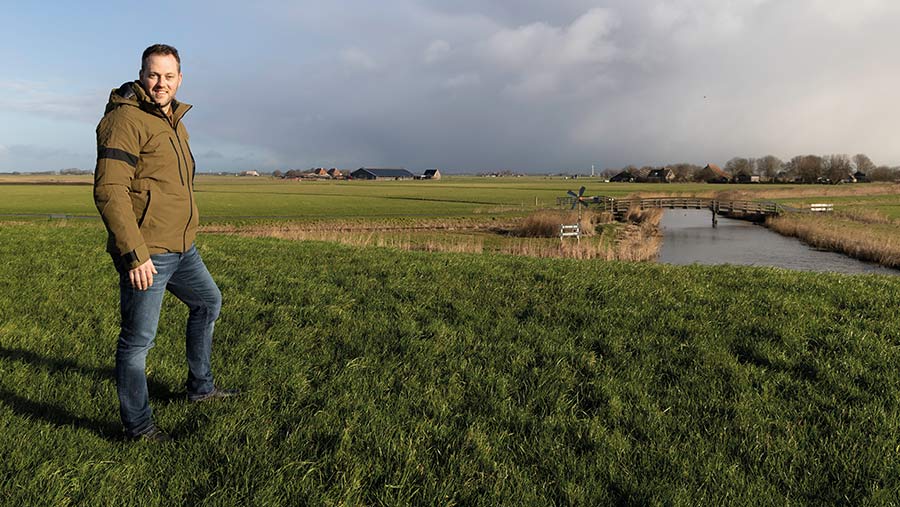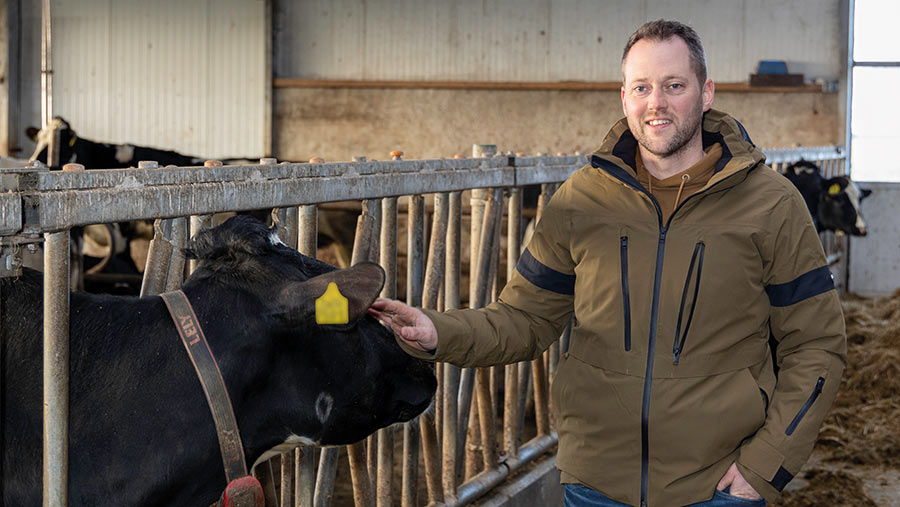Joint land ownership allows Dutch milk producer to extensify
 © Fotografie Jelly Mellem
© Fotografie Jelly Mellem Dairy producer Pieter van der Valk is balancing profitable farming with ecological benefits through an innovative model whereby farmers and private investors jointly own land.
When he heard that his neighbour wanted to sell 74 acres of land, Mr Van der Valk’s search for finance options developed into the idea of co-operative investment.
This has allowed him to access those extra acres by buying the land jointly with a private investor interested in promoting biodiversity.
He formed a land co-operative, Rijkdom, to do this and took on the additional 74 acres through the co-op six months ago.
See also: How to train heifers in robotic milking systems
“If I wanted to invest in the land it’s much too expensive to use it for ecological schemes, it’s simply the fact that these schemes are not being paid very well but farming is, so the only choice you have as a farmer is that if you have to pay a lot for the land, you have to use it intensively.”
Farm facts

© Fotografie Jelly Mellem
- Dairy farm near Ferwoude, Friesland, north-west Netherlands
- 173 acres fully owned land
- 74 acres in co-operative ownership on 50:50 basis
- 125 cows, year-round calving
- Heifer calves retained, bulls sold
- Milk yield: 9,993 litres a cow a year
- Milk price €62.5/100kg (53.7p/kg), includes sustainability bonus from milk buyer FrieslandCampina
- New farmstead built four years ago on greenfield site outside the village, where the original farmstead now hosts rental apartments with 27 beds
- Typical price of productive farmland in this region €26,300/acre (£22,479/acre)
The land is owned 50:50 by the farmer and the investor, with an agreement covering biodiversity targets and how the land will be managed, sharing risk and responsibility.
The farmer and investor co-design the biodiversity objectives and management agreement.
“We need to find a balance between the economic and the ecological benefits,” says Mr Van der Valk, who farms with his father Jacob.
“If it is implemented successfully, this is a giant leap in the approach to biodiversity.”
In Mr Van der Valk’s case, the ecological targets are mainly in relation to meadow birds.
This means higher water levels are maintained, herb-rich grasses are grown and under a Dutch government ecological scheme, he is paid to observe extended mowing dates.
This management approach creates a bridge between his milk-producing land and the neighbouring nature reserve.
In this co-operative ownership model, the farmer buys a half share in the land and pays the investor a rent of 1% of the purchase price of the other half so as to have year-round use of the land.
This compares with a typical market rent of about 2-2.5% for productive farmland.
Under normal conditions, the high cost of land forces farmers to intensify – for example, with potatoes or flower bulbs, says Mr Van der Valk.
He farms in an area of higher-than-average quality land, where values are about €26,300/acre (£22,479/acre).
The biodiverse fields are less productive, but access to the additional land means he can farm more extensively than otherwise and make the same profit.
There has been a small increase in cow numbers to 125 head, but extensification across the farm as a whole.
Mr Van der Valk’s milk is supplied to farmer co-op FrieslandCampina, which pays a sustainability bonus to producers who meet biodiversity targets, so the additional land helps achieve this.
As long as the element of biodiverse land is no higher than 15%, there is no productivity loss, says Mr Van der Valk.
The private investor’s financial input means Mr Van der Valk has no debt on half of the additional land. It allows extensification without loss of return because of the lower capital cost to the farmer.
For the investor, there are ecological benefits and the value of the land is preserved, with the potential for long-term value growth.
If the co-op wants to sell land – for example, if the private investor wants to withdraw – then the farmer joint owner has first refusal. Alternatively, another private investor is found.
National model
Mr Van der Valk is not looking for more land himself. “More land is not the goal,” he says. “I want to achieve a good balance between two opposing worlds.”
However, he wants to see the joint ownership approach spread. Interested investors are already registering with the co-op and more farmers are being sought.
The aim is to purchase land jointly throughout Friesland and it is hoped that ultimately the model will go national.
Rob Berkers is project manager for food and agri at Dutch lender Rabobank, which provided funding for Pieter to explore and develop his land co-operative idea.
Mr Berkers’ role focuses on climate and sustainability issues for the bank, with an area-based approach in line with that of the Dutch government.
He says that the co-operative approach to land ownership and biodiversity devised by Mr Van der Valk fits with the bank’s strategy of helping farmers find solutions to the many challenges they face.
“We are a small country, many people live here. Many functions are fighting for limited space. We want more nature, we want more houses to be built, we want more climate adaptation and we still want to produce food.
“We see a clash, a fight for limited space in a small country and in that clash farmers have to make strategic decisions.
“Some of them make a choice to quit, some move farms, but also many farmers choose to extensify. To be able to do this they must be profitable and this is one of the solutions that helps make extensive farming profitable.
“Many restrictions [on the way land is used] are now seen as limitations, but I hope we can turn that around so that when we look at the possibilities for the land, we look at functions that fit best on that land and I hope that then we can move it from a restrictive approach to an opportunity approach and that is also what Pieter is doing.”
The bank helped Mr Van der Valk with advice and knowledge, with networking and some funding alongside other parties to help him develop his idea into a working concept. It can also put private investors in contact with the land co-operative.
Rabobank is a co-operative, established 125 years ago. It began as a group of small farmer credit unions and now operates in 38 countries, with a focus on the food and agriculture sector.
Rijkdom land co-operative
Board of two farmers and two ecologists.
Founded with the support of several organisations – the Dutch government’s Regional Deal for Nature Inclusive Agriculture, farmer association LTO Noord, agricultural youth organisation NAJK, Boerenatuur, which supports farmers to fulfil nature and landscape agreements, and Rabobank.
